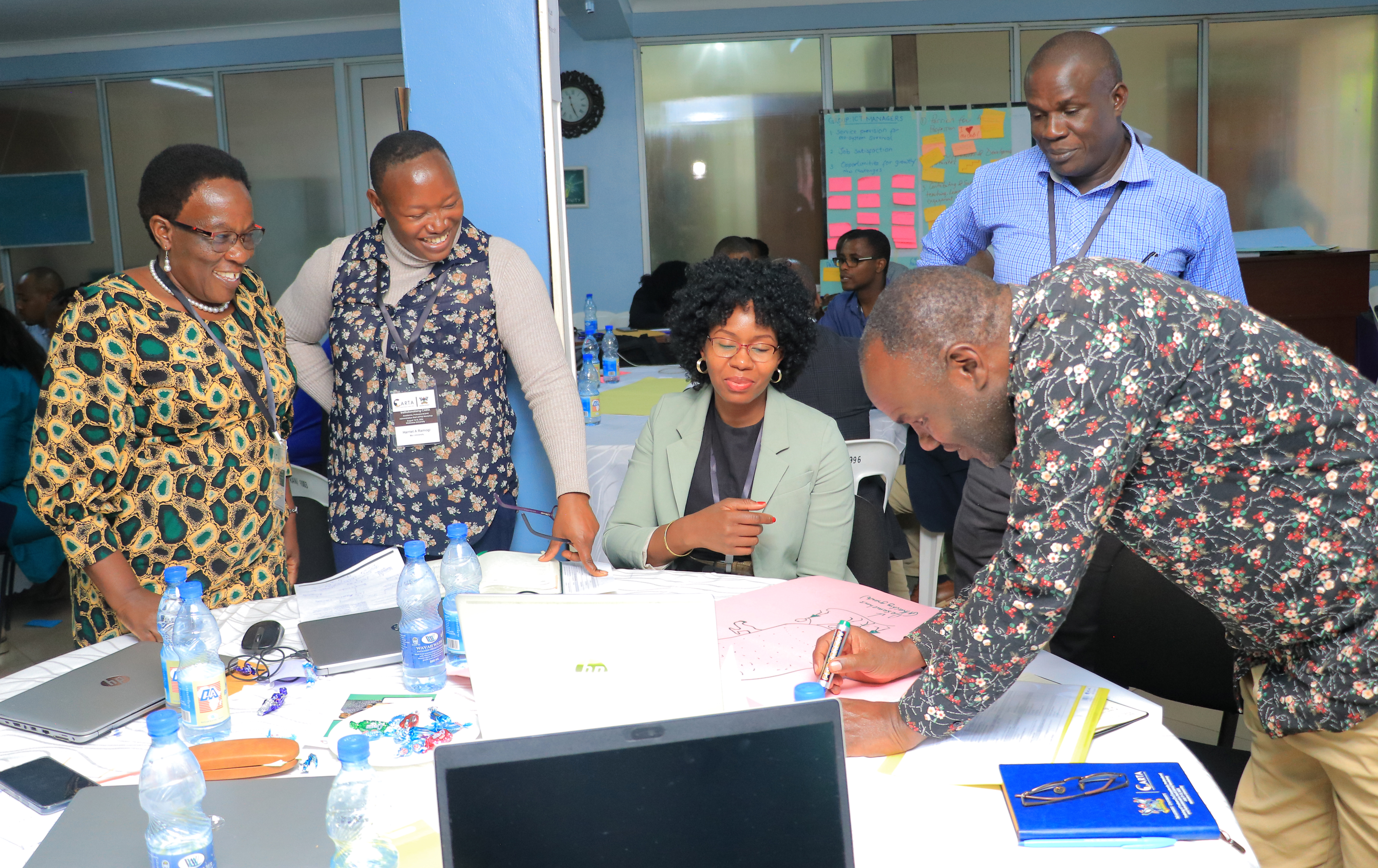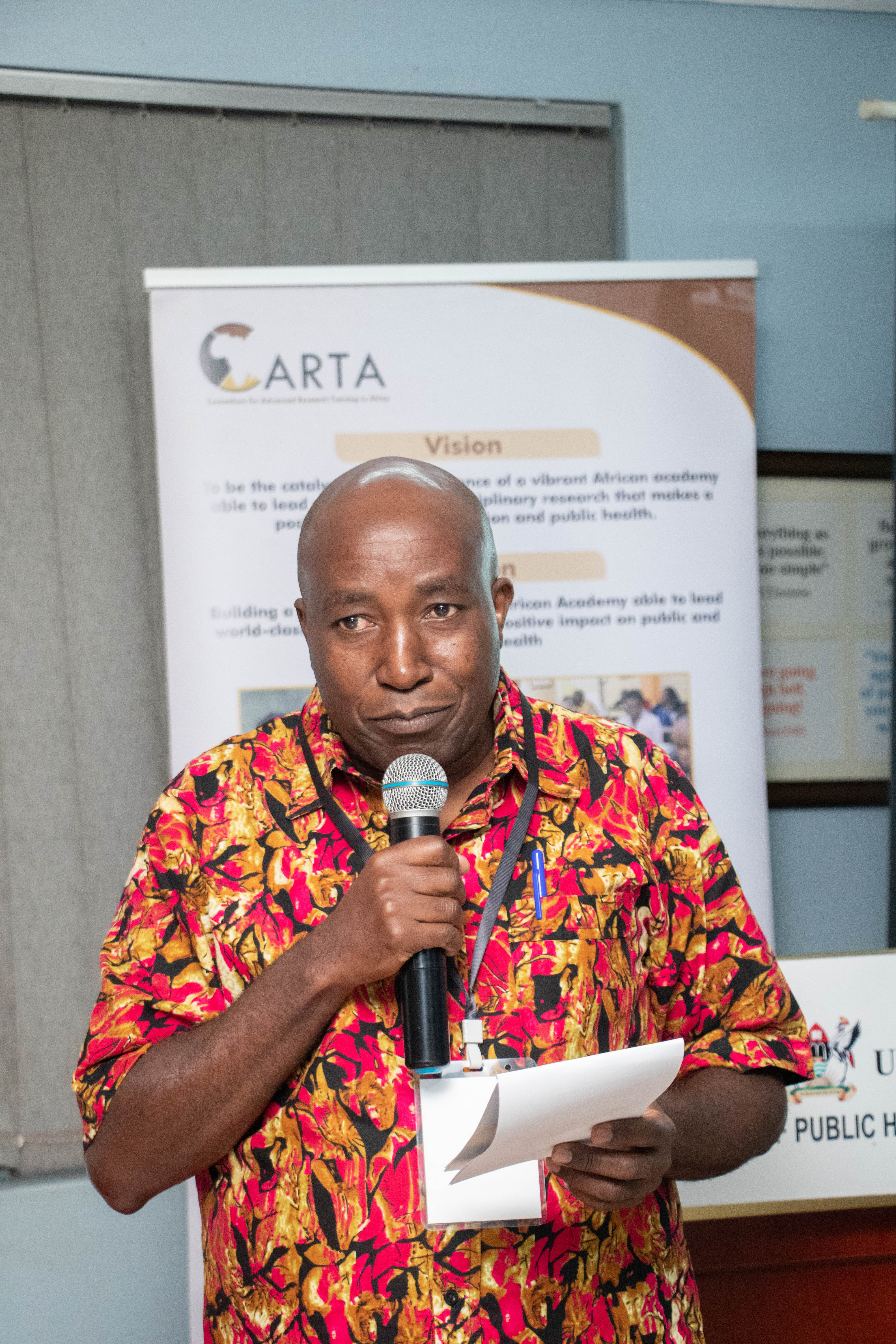
KAMPALA—Researchers in African Universities have been urged to cultivate a Responsive Culture, create, maintain, and strengthen collaborations, and uphold Research Ethics. In the CARTA programme, Participants explore the requirements for successful research in African universities, including researcher training based on global best practices. They also define and address knowledge management as the process of generating and sharing information; demonstrate the positive linkages between quality research and sustainable development in Africa.
These issues featured prominently at the CARTA's APAS Workshop in Kampala, a week-long training for Academic, Professional, and Administration Staff (APAS) and Trainers of Trainers (ToTs). It is organized by Makerere University and the Consortium for Advanced Research Training in Africa (CARTA).
Dr. John Bosco Isunju, the CARTA Focal Person, and iCARTA Project lead at Makerere University, highlighted the Workshop's Goal of fostering a responsive culture among Universities and Research Institutions Staff. By examining the efficiency of governance structures and processes that support research and graduate training in African Universities and Research Institutions. The CARTA programme seeks to create an environment conducive to the success of early-career and seasoned researchers.
Therefore, a total of 57 Participants and 14 Facilitators from across Africa are convening in Kampala to train on research systems, policies, and processes. The Participants are from Makerere University in Uganda; Moi University and University of Nairobi in Kenya; Obafemi Awolowo University and University of Ibadan, Nigeria; University of Rwanda, Rwanda; University of the Witwatersrand, South Africa; Kamuzu University of Health Sciences (KUHeS), Malawi. Further, Participants were drawn from Research Institutions including the African Population and Health Research Centre (APHRC), Kenya; Agincourt Health and Population Unit, South Africa; and Ifakara Health Institute, Tanzania.
The CARTA APAS Workshop was conducted in 3 days for all Participants; and an additional 2 days for the Training of Trainers (ToTs), from August 12th to 16th 2024, at Makerere University, School of Public Health - ResilientAfrica Network (MakSPH-RAN), Plot 28, Upper Kololo Terrace, Kampala, Uganda. At the end of the training, Participants were awarded Certificates and urged to cascade the knowledge and skills acquired in their respective institutions.
At the opening session, Dr. Rhoda Wanyenze, a Professor and Dean of Makerere University School of Public Health (MakSPH), emphasized the importance of collaborations in research among African academics.
She noted that over the past five years, MakSPH has collaborated with partners across 25 African countries, indicating a vast network of research partnerships. Dr. Wanyenze also expressed hope that Participants will leave the training with new partnerships and networks, further emphasizing the goal of fostering collaboration among attendees.
“Partnership is very important and I hope as we are here, we will be networking so that at the end of the APAS training, as we leave we will maintain the partnerships and continue to forge networks with researchers we haven't worked with before. That will hopefully be one of the outcomes of us working together during this APAS Training,” said Professor Wanyenze.
Over the years, Makerere University has enjoyed a long-standing partnership with APHRC. According to Dr. Wanyenze, there is a need to reduce bureaucratic bottlenecks that hinder productivity and collaboration in African Universities and Research Institutions needed to improve the university research ecosystem, with a key focus on students.
She further noted that; “Students are critical in the research ecosystem. They are smart; they have ideas, especially when we give them space and when they know that their views matter. We need to create an environment where students can communicate freely what they think works without feeling shy and thinking that you're going to throw it back at them, and make them feel uncomfortable in our Universities.”
Dr. Anne Nangulu, a Professor of Economic History and Principal of Bomet University College (a Constituent College of Moi University) who is also the Focal Point for CARTA at Moi University, believes it is vital for university officials to be proactive and plan ahead of time to execute their academic and research related duties and responsibilities. Prof. Nangulu, re-echoed Prof. Wanyenze, encouraged faculty to delegate some of their duties to students; early career academic and administrative staff as part of mentorship especially at postgraduate level.
Prof. Nangulu further noted that; "We might be a little selfish when funds arrive in small amounts. You want to accomplish everything such as data collecting, analysis and dissemination. Think about collaborative research by incorporating early career staff as well. Also, please update your resume today, keep it online, and keep it current. It is part of leadership in promoting institutional and individual visibility in the global space."
Dr. Joseph Gichuru Wang'ombe, a career development expert and Deputy Executive Director at APHRC, emphasized the need for greater participation in high-quality research and urged participants to actively develop research capacity.
“If you believe in something and put it into your mind and heart, it can be realized. The research and good quality research have to be done by more and more people, and that means that we are building capacity and enabling many others to do research.”
In addition, he stated that workshops emphasize the value of a supportive network of research administrators, clear distinctions between functionaries, the need for funding, mainly from African governments, and technology transfer for the continent.

“To appreciate that it is more than simply the research; it is also about what happens in the library. It is what happens in the Registrar's and bursar's offices. We are very happy to see people from many sections of our universities come together. One of the most amazing things we have noticed with CARTA APAS programme is that personnel in Universities as well as research institutions can come from the same institution and not know each other. They meet for the first time but the silos are broken when they return, you'll notice they've discovered new collaboration methods,” said Dr. Gichuru.
Dr. Akinyinka Omigbodun, a Professor of Obstetrics and Gynaecology at the University of Ibadan, believes that; Everyone in the university research ecosystem is essential and that institutions must try to use the multi-disciplinarity and expertise of their human resources to build better research environments.
He further emphasized that; “Let us all work as a group. If you observe soccer players, they are part of a team, but they also work in groups. You have the attackers, midfielders, and the defense. You will find that even defenders score goals. The attackers go back to defend when the team is under pressure. Thus, we all must learn to appreciate and do work as teams as well as groups; that way, we can achieve more in African Universities and Research Institutions.”
Started in 2007/2008, CARTA, a Consortium of eight African Partner Universities, four Research Institutions, and Eight non-African Partner Institutions has been led jointly by the African Population and Health Center, Kenya, and the University of the Witwatersrand, South Africa.
Every year, CARTA facilitates APAS Workshops to strengthen the capacity of institutional functionaries. The iCARTA Project at Makerere University (a NORHED II grant from NORAD), and the Global Science for Africa Foundation (SFA) through CARTA funded the Workshop. This programme seeks to inspire Participants to improve commitment to institutional systems and drive transformation to attain world-class research in African Universities and affiliated research institutions.
In sum, CARTA works as a collaborative arrangement to support sustainable development of a vibrant African Academy able to lead world-class multidisciplinary research that positively impacts public and population health.
By Davidson Ndyabahika

